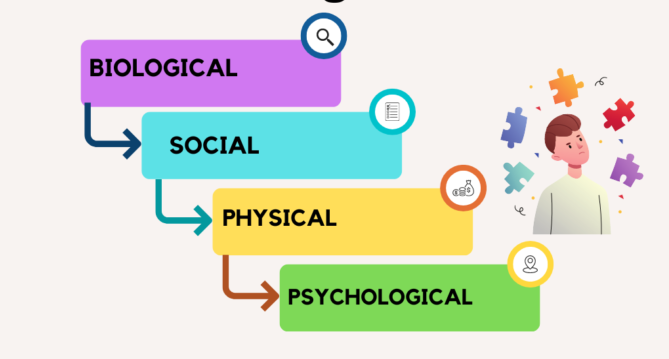Factors that affect on Mental Health
Mental healths includes our emotional, psychological, and social well-being. It affects how we think, feel, and act. They also helps determine how we handle stress, relate to others, and make healthy choices. It can be influenced by a variety of factors, and the causes are often interconnected. Here are some common factors to mental health effects:
– Biological Factors: A family history of mental health disorders can increase the chances of mental healths problem in individuals. Imbalances in neurotransmitters on the basis of which brain send signals to body which can impact on our mood and behavior.
– Environmental Factors: Adverse experiences during childhood, such as trauma or abuse, can have lasting effects on mental health. Family dynamics, relationships, and support systems also play a crucial role in mental well-being. Significant life changes, such as loss, divorce, or financial difficulties, can contribute to mental health challenges.
– Psychological Factors: Certain personality characteristics may make individuals more prone to mental health issues. Ineffective coping mechanisms or a lack of healthy coping strategies can impact mental resilience.
– Social Factors: Lack of social connections and feelings of isolation or loneliness can contribute to mental health problems. Experiencing discrimination due to factors like race, gender, or sexual orientation can affect mental well-being.
– Health Conditions: Certain physical health issues can influence mental health, and vice versa. Drug or alcohol misuse can contribute to mental health disorders or exacerbate existing conditions. As health plays great role in our live, without good health we our body get harmed physically, mentally and psychologically.
– Traumatic Experiences: Exposure to traumatic events, such as accidents, violence, or disasters, can have lasting psychological effects. Sometime these kind of stressed experiences can effect directly on our mental, physical and over all well-being.
– Neurodevelopmental Factors: Abnormalities or disruptions in brain development, especially during critical periods, may contribute to mental health disorders.
– Work and Academic Environment: High levels of stress, demanding work environments, or job insecurity can impact mental health. Academic stress and pressure can affect the mental well-being of students.
It’s important to recognize that mental health is influenced by a combination of these factors, and individual experiences vary. Additionally, seeking professional help and support can play a crucial role in managing and improving mental healths. Understanding the complexity of these factors helps in developing holistic approaches to mental health care and support.




Post Comment